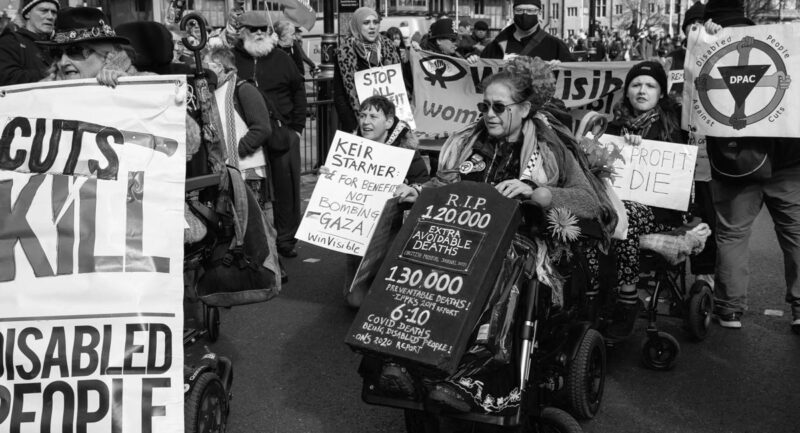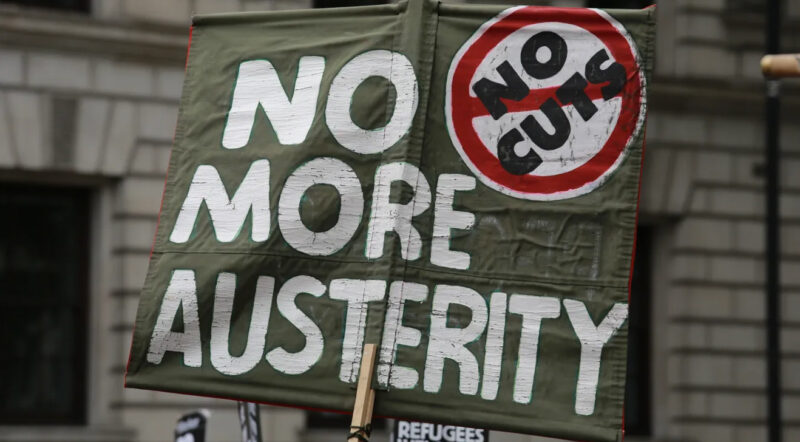The Eurozone fiscal-union deal must be stopped!
 The fiscal union in Europe is potentially a turning point which would see years of austerity and poverty across Europe – it must be resisted and stopped. A statement by the League for the Fifth International
The fiscal union in Europe is potentially a turning point which would see years of austerity and poverty across Europe – it must be resisted and stopped. A statement by the League for the Fifth International
On December 2, the German Chancellor, Angela Merkel, said “Europe is in the middle of its greatest test” and called openly for the transformation of the Eurozone – or its inner core – into a new Fiscal Union. Likewise, on the eve of the Brussels conference, the French President, Nicolas Sarkozy, told a gathering of centre right European parties “Never has the risk of a disintegration of Europe been so great. Europe is facing an extraordinarily dangerous situation.” Neither was exaggerating.
The Eurozone crisis that originated with the Greek debt crisis was sharpened by the prospect of a return to recession, not only in Europe but in the global economy itself. Despite this, Europe’s political leaders have rushed to implement policies demanded by the banks, the bond markets and the ratings agencies that will make matters worse. The severe austerity programmes that are the necessary consequence of the financial stabilisation policy will not only mean dramatic attacks on the living standards and economic prospects of large parts of the European working class but also deepen the recession.
The principal decisions of the summit, to limit annual structural deficits to 0.5 per cent of GDP and to impose severe sanctions on countries whose public deficits are more than 3 per cent of GDP, points to a clear turn away from Keynesian methods of trying to restore economic growth by increased state spending. Instead, state expenditure will be slashed, taxes raised and public assets sold off, in order to pay off state debts to the bankers and bond holders.
The results will be massive unemployment and cut backs across the public sector. Moreover, these spending limits must be a written into the constitutions of the European states. This points not to a short-term emergency measure but a long term restructuring of the economy in the interests of the bankocracy and the rich. This is what Merkel meant when she said “We will use the crisis as a chance for a new beginning”.
The decisions of the summit meeting also highlight the democratic deficit at the heart of Europe. None of the European leaders had a mandate from their voters to agree to these policies. Most governments will simply implement the new measures by administrative decision. Only Ireland will have a referendum on the new fiscal policy. Some countries, such as Sweden, will have to take the agreement through their parliaments but, by definition, the governments have majorities there that also lack any mandate. Such parliamentary charades cannot disguise the fact that, in future, unelected EU officials will have the power to review national budgets, in effect, imposing tax and spending cuts on member states, and the European Court of Justice will overrule elected governments if they do not cut savagely enough.
At the summit David Cameron ¬ vetoed these proposals for the European Union, though Britain is not a member of the Eurozone. He claimed to be doing this “in Britain’s national interest” but he hardly bothered to conceal that this was ensure the City of London’s ability to remain an unregulated billionaire speculators paradise.
He has no objection, of course, to the austerity imposing objectives of Merkel and Sarkozy targeted at the weaker southern European economies. He made it clear that he would lift his veto if the EU ‘repatriated’ a raft of mildly progressive regulation that had been ‘imposed’ on Britain (working time directive, social chapter, human rights etc.)
However Merkel and Sarkozy contemptuously swept aside both his request for bribes and his veto and went ahead; with only Britain voting against. Thus he put Britain potentially in an EU outer core, a slow lane of one!
The European Central Bank (ECB) and the Sarkozy-Merkel block have made it clear that they will not allow the City of London to remain a haven where their financiers can speculate with unregulated abandon. Something of a war will probably be waged against the City, and Britain could even potentially find itself shut out of European markets if – and this is still a big if – the Eurozone escapes from its crisis.
The twin crisis of Europe
The speed with which this was agreed, and the fact that it was near unanimous, points to the pressure on the elected politicians that was brought to bear by the 1%. This minority, the bankers and financiers, the owners and CEOs of the huge industrial and commercial corporations, were demanding urgent action. Even the British veto was only used in an attempt to defend the interests of the City of London. Why? Because two crises were coming to a head at the same time and the 1% were, and are, determined to force the working class of Europe, and the middle strata too, to pay the cost of resolving them.
The first of the two crises is the sovereign (that is, state) debt crisis. Several European Union countries ran up massive debts even before the recession in 2008 and have seen their tax revenues plunge and unemployment benefits soar since then. Unlike the USA, which has tried to stimulate growth by devaluing its currency and boosting exports, the weaker members of the Eurozone like Greece, Portugal, Spain and Italy could not adjust the value of their currencies because they use the euro. With no prospect of economic growth, they can now only borrow on the bond markets at impossibly high interest rates. Without new loans, they face the prospect being unable to repay existing debts.
The second crisis centres on what the Governor of the Bank of England, Mervyn King, called “early signs of a credit crunch” and what the Bank of Japan’s deputy governor, Kiyohiko Nishimura, said was a “widespread credit crunch.” Banks have stopped lending and are hoarding cash as the prospects of future returns look dim. If they lend to governments by buying bonds, they fear they may never be repaid. If they buy shares, they face losses through falling share values as recession looms.
On 1 December, Eurozone banks borrowed more than €8 billion overnight from the ECB just to keep themselves afloat. At the same time, five central banks, led by the US Federal Reserve, announced “emergency action” to help banks get access to money. These unprecedented and dramatic interventions suggest the banks had ceased to lend to each other – meaning they feared that a major bank might be on the point of collapse and could not be trusted to repay even short-term loans.
Less than five years since the first signs of the last credit crunch appeared (early 2007) and less than four years since the Great Recession of 2008-09, the Wall Street Journal fears “a repeat next year with a different cast of characters but an equally scary ending”.
The US investment bank Goldman Sachs says these two crises will push much of the world back into recession. Last time, they say, it was sub-prime mortgages and the collapse of major banks and hedge funds that catalysed the crisis, this time it will be Europe, because “the sovereign and banking crises have now taken on a systemic dimension, with investors increasingly questioning the survival of the euro and the euro area”.
The risk of a banking crisis is not limited to the Eurozone. The Bank of England’s Financial Stability Report warns that the four biggest UK banks have a net exposure to Ireland, Spain, Italy, Greece and Portugal of £172.3 billion, which is 83 per cent of their total core capital.
The leading European capitalists in Germany and France, because they are the hegemonic powers in the Eurozone and the EU as a whole, are desperate to defend the Euro and their political and economic domination of Europe. If the euro collapsed, Germany would lose its built-in exchange rate advantage, which has benefited its huge export industries in European markets.
A post-euro world would see sharper rivalries between European states, geopolitical instability, increased moves towards protectionism; all restricting world trade and fuelling political and economic conflicts. Global powers like China and the USA would vie for influence over a patchwork of shifting European alliances.
How can they implement this proposal?
For Germany and Angela Merkel the new Fiscal Union poses three further problems which must be resolved:
• Who will be in, or out, of a new fiscal union? Greece could be dumped from the euro, if so, its new currency would plummet, the middle class and small businesspeople and savers would be ruined, banks would collapse.
• How to boost the size of the EU’s bailout fund. At present, it has just €250 billion, nowhere near enough to bail out Italy and Spain, and far less than the €1 trillion promised in the last “urgent talks”. The fund is essential to build a ‘firewall’ around Greece, or stop the ‘contagion’ spreading to Italy. Unless they find more cash, the new EU could be a lot smaller than the old one.
• The utter lack of democratic process in these decisions is a growing concern because it opens up a space for resistance across civil society. The very immediate concerns of the poorest or the working class who will be most adversely affected by these decisions are ignored and they have no voice in these decisions. This is the brave new world of capitalism – all talk of democracy and the ‘people’ have been abandoned, even as the masses in Egypt have stood on their feet to fight for it.
There is no shortage of countries in Europe with historic reasons to reject the prospect of German control. The “democratic deficit” is a major political obstacle to the implementation of the whole Brussels package. The governments of Greece and Italy have already been removed by the diktat of European and international finance. Can it be an accident that the new Italian government has no lack of bankers but not one elected politician?
Some moderates in the working class movement will propose tepid reforms of the EU, the issuance of Euro bonds and so on, without noticing that fiscal union would represent a big step towards consolidation of a new European imperialist power, free of all democratic controls.
Others in the movement will – rightly – demand that governments default on their national debts and cancel the austerity programmes. Many outside of the old core of the EU – will demand an exit from it, a return to the old “independent” national currencies. They will use, and are already using anti-German demagogy. But they ignore the fact that a retreat back to national economies would guarantee a sharp contraction of the European economy as a whole. A patchwork quilt of ‘independent’ capitalist states, each ruled by a desperate class determined to cut harder than their rivals, is no solution for the working class.
Indeed the whole process of the creation of the EU/Euro bloc was a result of the contradiction, long ago observed by Marxists, that the productive forces of Europe were being cramped and strangled by the too narrow borders of the European states. To restore them, even if there remained an inner core dominated by France and Germany, would mean a collapse of the productive forces and millions more unemployed. It would be quite literally a reactionary solution.
At the same time, the repeated capitalist crises show the system has no way out except over the broken bones of the working people. In every country, the bosses and their governments are slashing public sector jobs and pay, throwing millions onto the dole, making barbaric cuts to education, healthcare and benefits, abolishing pension rights and tearing up hard won trade union collective agreements. This is what is meant by “labour market flexibility”.
Thus, across Europe, the working class movement faces a historic attack on a scale not seen since the 1930s. In every country there has to be a radical revision of programmes, organisations and leaderships in order to resist the bosses’ offensive and to present an alternative global solution to capitalism.
How we can stop it
Firstly, we need to say no to the Merkel-Sarkosy plan of a fiscal union and the control of the national budgets by the bankers and “experts” from Goldman Sachs and the like. On the contrary, we need to demand the protection of all health, education, municipal services and welfare benefits. Politically, the central demand must be for a national referendum in all countries: we demand the right to decide if these measures are enacted or not. Campaigns across the continent for referenda are crucial in the coming months, not least because they expose the democratic deficit at the heart of the EU project. Neither the new EU Treaty nor any “balanced budget” amendments to national law or constitutions should be adopted by governments or parliaments without the direct democratic decision of the people after the widest and freest discussion. National budgets should not be submitted to the Eurocrats for approval, they should be submitted to the people.
As part of this struggle, all labour movement, anti-capitalist, left and revolutionary forces across the continent should come together in an assembly to debate a Europe wide resistance to these proposals and to the national austerity packages. This is the progressive alternative to a retreat into nationally isolated struggles or forming alliances with reactionary nationalist forces “against the Franco-German dominated EU”.
At such a meeting, we can begin to discuss building an alternative Europe. How can we keep what is positive about the developments in Europe (no borders, greater integration) whilst challenging what is wrong – the free market, the undemocratic institutions? A more democratic solution would be direct elections by proportional representation right across the European Union to a sovereign Constituent Assembly whose members would be answerable to, and recallable by, their constituents.
Such a body would be an enormous focus for working class and popular demands. The workers’ movement could demand that the Assembly decide not only on the fate of the euro and the European Central Bank (putting it under democratic/working class control) but constitutionally guarantees the health and welfare systems of the continent, with a plan of public works to bring all up to the highest levels in existing in particular states.
It could also decree the nationalisation, without compensation, of the major banks and financial centres of the continent and draw up a plan of public works to absorb all the unemployed. It could mobilise labour and resources to aid the development of countries in the Global south who have been bled white by centuries of European imperialist exploitation, and sweep away the fortress Europe bans on migration. In short, it could lay the basis of a Socialist United States of Europe.
However, this perspective could never be carried out simply by a process of normal elections or referenda. It could only be realised as the by product of a Europe-wide revolution or the spread of national revolutions. These would have to develop out of a mass, continent-wide movement of rejection of austerity and the dictatorship of capital.
This, rather than a return to nationally isolated states and their currencies, should be the strategic course of the European workers’ movement. The national isolationist alternative will encourage a descent into horrific chauvinism, with the ‘loser’ nations engaging in anti-German or anti French chauvinism. Already, the Stalinist and left social democratic traditions in some countries engage in this regularly. To generalise this would be to divide and fatally weaken the entire workers’ movement, which must be internationalist and revolutionary or it will be nothing, a mere plaything of the most reactionary sections of the national ruling classes.
What kind of Europe?
The majority must not pay a euro for the crimes of the billionaire profiteers. Indeed, these parasites must be subjected to “savage taxation” and, if they attempt to shift their capital abroad, it must be stopped and confiscated. For this purpose we must create workers’ control over the banks and bring an end to banking secrecy. The banks must be nationalised while protecting the deposits of the workers, the middle classes and their pension funds. They must be concentrated into one single state bank but under popular democratic control.
To coordinate our resistance, we need to generalise and escalate the existing 24 or 48 hour protest strikes against austerity into indefinite stoppages, general strikes, that can bring down the cutting governments. We need to replace them with governments based not on technocrats and bankers, but on councils of workers’ delegates. What sort of programme would a workers’ government carry out?
It would tear up all the austerity plans; renounce the state debts to the billionaire bondholders; expropriate the banks and confiscate the private wealth of the 1 percent. On this basis, it would be possible to fund an emergency plan to provide jobs for all the unemployed, for the redevelopment of ravaged industries and social services, to build social housing, schools and hospitals. It would be possible to reverse the rampant social inequality of the neoliberal decades, to restore the environment and start halting climate change.
There must be no illusions that solutions can be found within national borders. Capitalism has begun to integrate the European economy but the capitalists themselves are national classes who cannot complete the process. For that, we need a Socialist United States of Europe, based on the councils and other fighting organisations that must be built in the struggle against austerity









